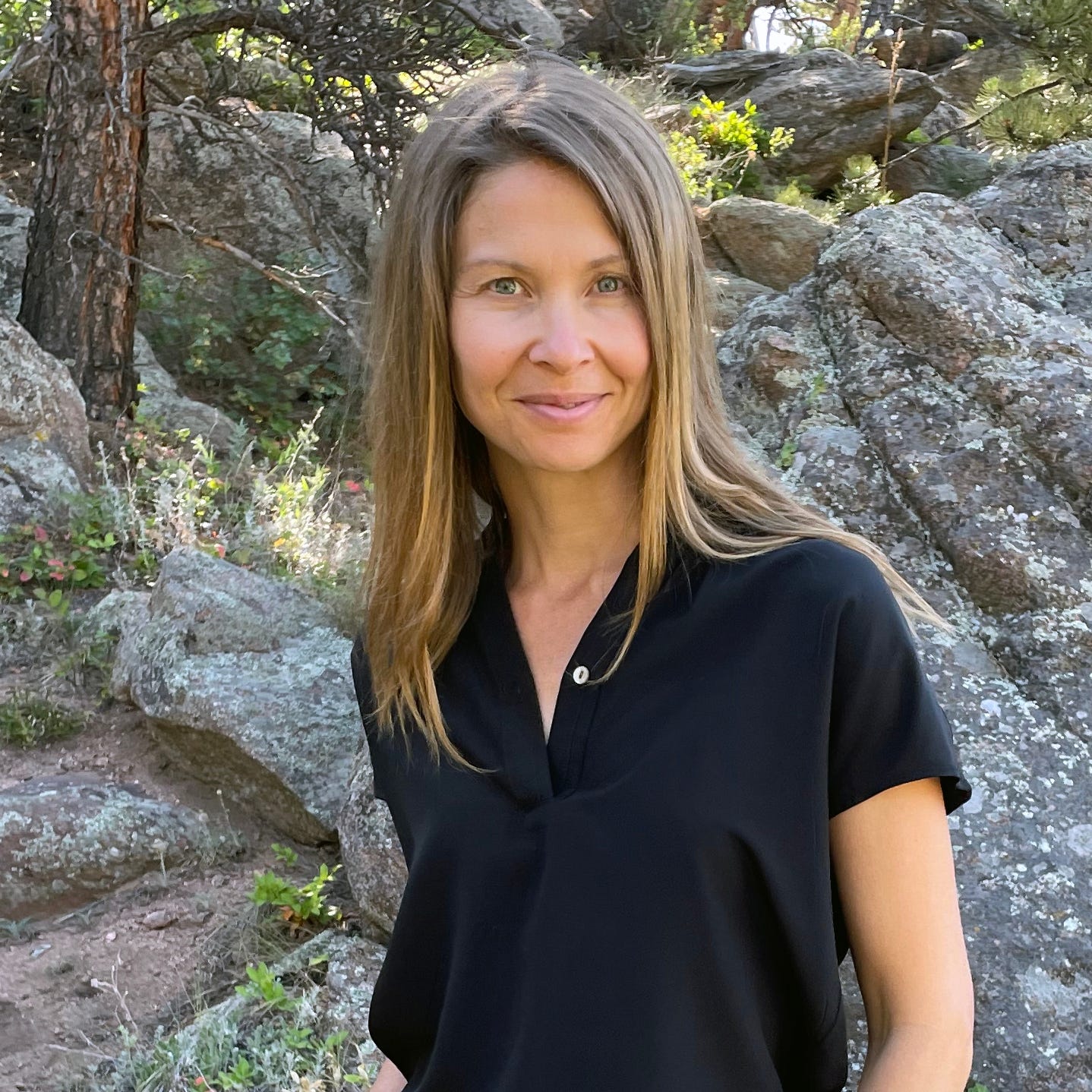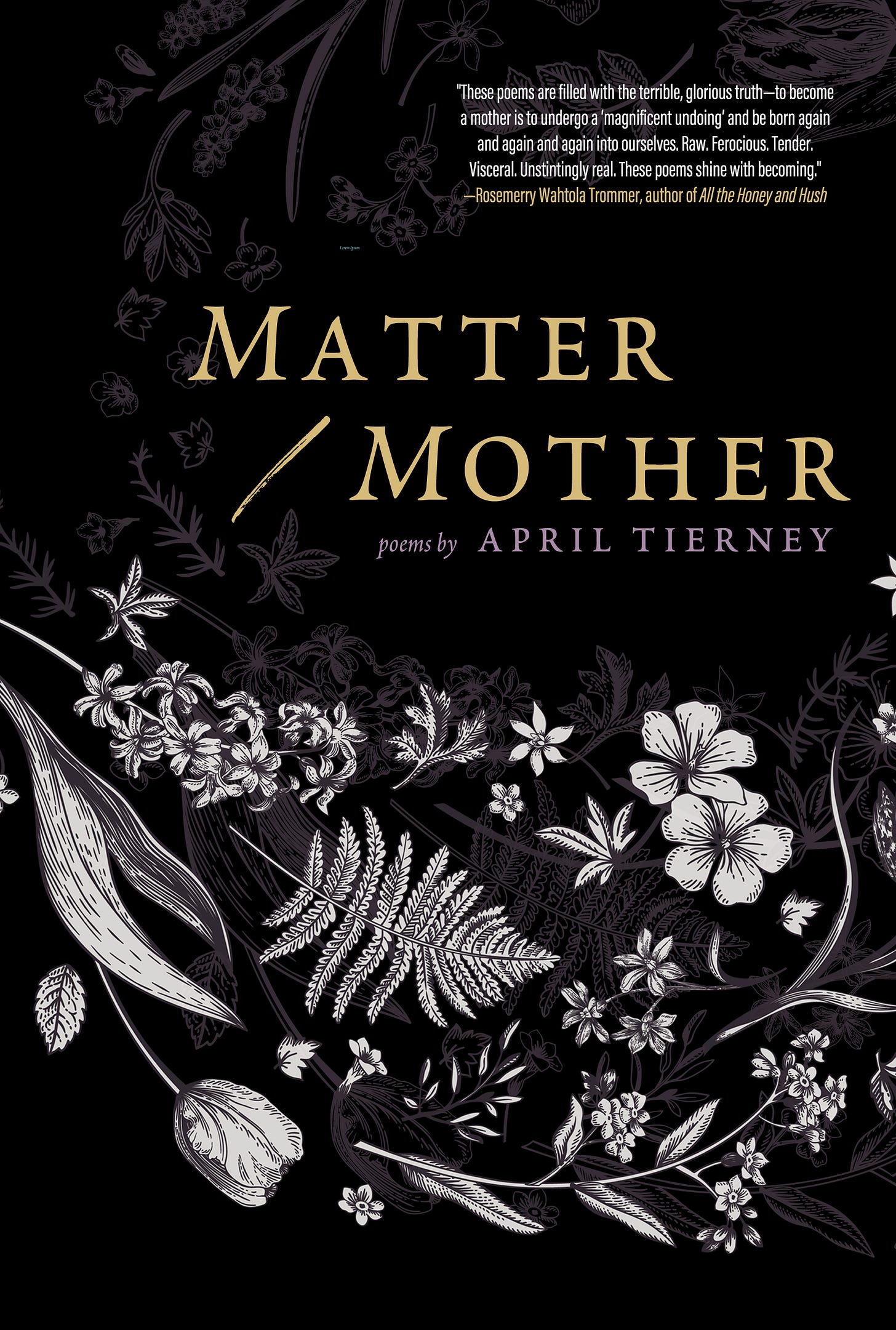Welcome to the first installment of the Wayfarer Books & Magazine Interview Series!
Our first guest is April Tierney, author of the recently released poetry collection, Matter/Mother. April is a poet, activist, craftswoman, mother, and lover of stories. Her work follows threads of ecopoetics, myth, culture, and lineage. She has been nominated for The Pushcart Prize and featured in Orion Magazine, Deep Times: A Journal of the Work that Reconnects, Clarion Poetry Magazine, and Real Ground Journal, among others.
HB: Tell us about how this particular poetry collection was created. What was your writing process like? It’s a collection all about motherhood, so how was creating it similar to the gestation/birth/mothering process?
AT: I wrote these poems during the first two and a half years of my daughter’s life. Most days while she napped, I labored to bring forth some of the stories and realities of mothering within an anthropocentric, capitalisic, nuclear family paradigm––stories that have often been repressed or dismissed. This is the book that I longed to read in that early postpartum time, but which I could not find. It is raw, dark, truthful and redemptive.
I wasn’t sleeping for the vast majority of the time I was writing Matter/Mother, so the process itself felt quite mad. But in that feverish desperation to make sense of my reality, creating these poems also helped to anchor me into a foundation of sanity that I may not have otherwise been able to inhabit. So in that way, this book was very much like the gestation/birth/mothering journey––mysterious, raw, messy, harrowing, and ultimately, life-serving.
HB: What was the root inspiration of this project? Why now?
AT: For the first two years after my daughter’s birth, I experienced intense postpartum anxiety, while other mothers around me were facing debilitating panic attacks, depression, insomnia, physical pain, and autoimmune disorders. This inspired me to ask deeper questions about the conditions which lead to such high levels of dis-ease within this essential role. I knew it couldn’t all be blamed on hormonal shifts, as so many people proclaim, but rather the lack of wellness and cohesion of the times we are mothering within.
In Earth-based cultures, mothers are held at the center. As life-bearers, they are treated with the same care and respect as Mother Earth. However, in industrialized societies where the Earth is both exploited and neglected, mothers are, too. As if this were not sorrowing enough, we mothers often internalize our struggles as personal inadequacies, rather than something that is culturally imposed. So, in writing this book, I felt it was important to draw a connection between our treatment of the Earth and of our life-bearers, in order to shed light on the circumstances we find ourselves in now. Because, as we know, the first step in effecting meaningful change is to be able to tell stories about our realities so that we can eventually reshape them.
HB: Do you have a favorite poem from your latest work? (Or perhaps one that you wrestled with the most…..?) What makes it/them stand out to you?
AT: I’m not sure if it’s my favorite, but the poem I wrestled with the most is called Rage/The River, which is a piece about maternal rage, the thing that so many of us experience but are not supposed to talk about. It took a few months to even begin formulating the concept in my mind, largely because I had not heard or seen it explored in much depth before. And when I did eventually show up to the page, I had to continually stretch myself beyond the language that I had access to, in order to arrive at something that felt honest and humanizing.
I think part of the reason why mothers don’t talk about their rage is because they are afraid of being labeled as ungrateful or incapable of fulfilling this role. When in reality, it’s not our children we are angry with, but the impossibility of raising the next generation without adequate support. We were not designed to parent without a proper village, and the advent of the nuclear family has broken down this innate wisdom in every possible way. It has put an intense level of pressure on parents that our systems cannot withstand, which is why we see such high levels of illness, burnout, distraction, and addiction.
Writing about rage, along with many of the other taboo subjects in this book, felt like a necessary step in shifting the lens away from the individual to begin redirecting accountability toward a culture that takes advantage of both mothers and the Earth. It’s my sincere prayer that this shift in perspective can help to create waves of change.
HB: Where is your creativity taking you now?
I actually have not written anything since completing this collection almost a year ago, which has been the longest I have gone without writing in my adult life. Creating Matter/Mother while in the early stages of motherhood, took absolutely everything out of me. So I’m not sure when I’ll pick up the pen again, but I am thoroughly enjoying (and needing) the break. Thankfully, I am a very creative person, so when the words are not flowing, I find other ways of bringing beauty into the world. I enjoy weaving baskets and working on my table loom, as well as making jewelry, baking, and tending to our garden.
HB: Thanks so much, April, for sharing about your work with us. May we all find the courage and space to rest and exercise our creativity in the ways that serve best in this season.
"A raw, intimate and incandescent descent into the deep matter of motherhood, April Tierney’s new book of poetry speaks directly to the hearts of mothers everywhere. Loss, grief, joy, bewilderment, each poem is an exploration of the land of rough magic that is motherhood, and an invitation to come home. Like the layers of illumination in a dense forest, Tierney captures the complex light of motherhood in a way that made this mother feel deeply seen."
–Asia Suler, author of Mirrors in the Earth



